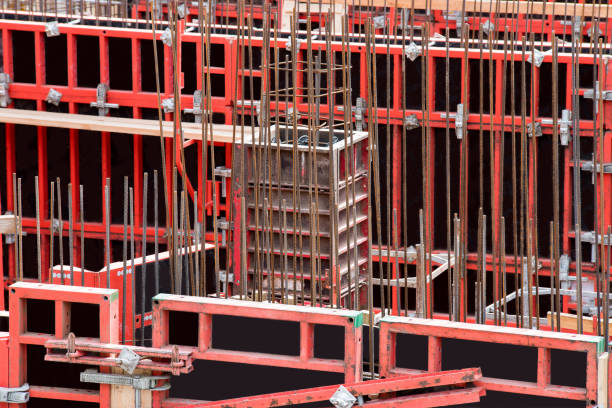
Introduction
The construction industry continually evolves, with innovations that improve efficiency, safety, and overall project quality. One such innovation is modular formwork, a system that has revolutionized the way concrete structures are built. Modular formwork offers numerous advantages over traditional formwork methods, making it a popular choice for a wide range of construction projects. In this blog, we’ll explore what modular formwork is, how it works, its benefits, and its applications in modern construction.

Understanding Modular Formwork
Modular formwork is a type of concrete formwork system composed of pre-engineered, reusable panels that are designed to be easily assembled, disassembled, and adjusted to fit various construction needs. These panels, often made from materials like steel, aluminium, or high-density plastic, are manufactured in standard sizes but can be configured in multiple ways to create different shapes and structures.
Key Components of Modular Formwork:
- Panels: The primary component, these panels come in various sizes and can be connected to form walls, columns, slabs, and other structural elements.
- Fasteners and Connectors: These secure the panels together, ensuring stability and alignment during the concrete pouring process.
- Supports and Bracing: These elements provide additional support to the panels, ensuring that the formwork maintains its shape under the pressure of the poured concrete.
- Adjustable Props: Used to support the formwork vertically, especially when constructing slabs or elevated sections.
How Modular Formwork Works
The modular formwork system operates on the principle of modularity — a flexible system of parts that can be assembled in various configurations to meet different project needs. Here’s a general overview of how it works:
- Design and Planning: Before construction begins, the formwork system is planned and designed based on the architectural and structural requirements of the project. The formwork layout is optimized to reduce the number of panels and connectors needed, which minimizes material costs and labor time.
- Assembly: The pre-engineered panels are delivered to the construction site, where they are quickly assembled into the required configuration. The assembly process is straightforward, involving the connection of panels using fasteners and connectors, followed by the addition of supports and bracing.
- Concrete Pouring: Once the formwork is assembled and checked for alignment and stability, concrete is poured into the formwork. The formwork system holds the concrete in place as it cures, ensuring that it sets in the desired shape.
- Disassembly and Reuse: After the concrete has cured, the formwork is disassembled and removed. Because the panels are reusable, they can be cleaned, stored, and used again on subsequent projects, making modular formwork a cost-effective and sustainable solution.
Advantages of Modular Formwork
Modular formwork offers several key advantages over traditional formwork systems, making it a preferred choice for many construction projects:
1. Efficiency and Speed
- Quick Assembly and Disassembly: The modular design allows for rapid assembly and disassembly, significantly reducing construction time compared to traditional formwork methods.
- Reduced Labor Costs: The simplicity and ease of use of modular formwork systems mean that fewer workers are required for assembly, leading to lower labor costs.
- Faster Project Completion: With the ability to quickly set up, pour, and dismantle formwork, projects can be completed faster, which is particularly beneficial for large-scale developments.
2. Versatility
- Adaptability: Modular formwork can be adjusted to fit various shapes and sizes, making it suitable for a wide range of construction projects, from simple residential buildings to complex industrial structures.
- Customization: The modular nature allows for customization, enabling contractors to create unique designs without the need for specialized formwork.
3. Cost-Effectiveness
- Reusable Components: The reusability of modular formwork panels reduces the need for purchasing new materials for each project, leading to significant cost savings over time.
- Reduced Material Waste: Modular formwork systems are designed to be precise, which minimizes material waste and contributes to more sustainable construction practices.
4. High-Quality Finishes
- Smooth Concrete Surfaces: Modular formwork panels are manufactured with precision, resulting in smoother concrete surfaces with minimal need for additional finishing work.
- Consistency and Accuracy: The system’s engineered design ensures consistent results, with accurate alignment and uniformity across all structural elements.
5. Safety
- Stable and Secure: The modular design, combined with robust materials, provides a stable and secure formwork system that reduces the risk of collapse or misalignment during the concrete pouring process.
- Ease of Handling: The lightweight nature of materials like aluminium and plastic makes the formwork easier to handle, reducing the risk of worker injury during assembly and disassembly.
Applications of Modular Formwork
Modular formwork is used in a wide range of construction projects due to its flexibility and efficiency:
1. Residential Construction
- Modular formwork is commonly used in residential construction for building walls, slabs, and columns. Its ability to quickly adapt to different layouts makes it ideal for housing projects.
2. Commercial and Industrial Buildings
- The system is also employed in the construction of commercial and industrial buildings, where speed and efficiency are critical to meeting tight deadlines.
3. Infrastructure Projects
- In infrastructure projects like bridges, tunnels, and highways, modular formwork provides the flexibility and strength needed to construct large and complex structures.
4. High-Rise Buildings
- For high-rise construction, modular formwork is invaluable due to its ability to be reused across multiple floors, ensuring consistent quality and speeding up the overall construction process.
Conclusion
Modular formwork represents a significant advancement in construction technology, offering numerous benefits over traditional formwork methods. Its efficiency, versatility, cost-effectiveness, and ability to produce high-quality finishes make it an ideal choice for a wide range of construction projects. Whether you’re working on a small residential building or a large-scale infrastructure project, modular formwork provides the flexibility and reliability needed to ensure success. As the construction industry continues to evolve, modular formwork will undoubtedly play an increasingly important role in shaping the future of building.








Mostbet oynash uchun eng yaxshi imkoniyatlar | Mostbet orqali yuqori xavfsizlik bilan pul tikish | Mostbet aviator skachat va yutuq imkoniyatlari | Mostbet uz mobil ilovasi orqali xavfsiz to‘lovlar | Mostbet oynash va o‘yinlarni boshlash uchun maslahatlar скачать mostbet casino | Mostbet uz oynash va sportga pul tikish bo‘yicha maslahatlar | Mostbet uz kazino va sport turlari haqida ma’lumot | Mostbet uz skachat va o‘yinlarni boshlash uchun maslahatlar mostbet yuklab olish.